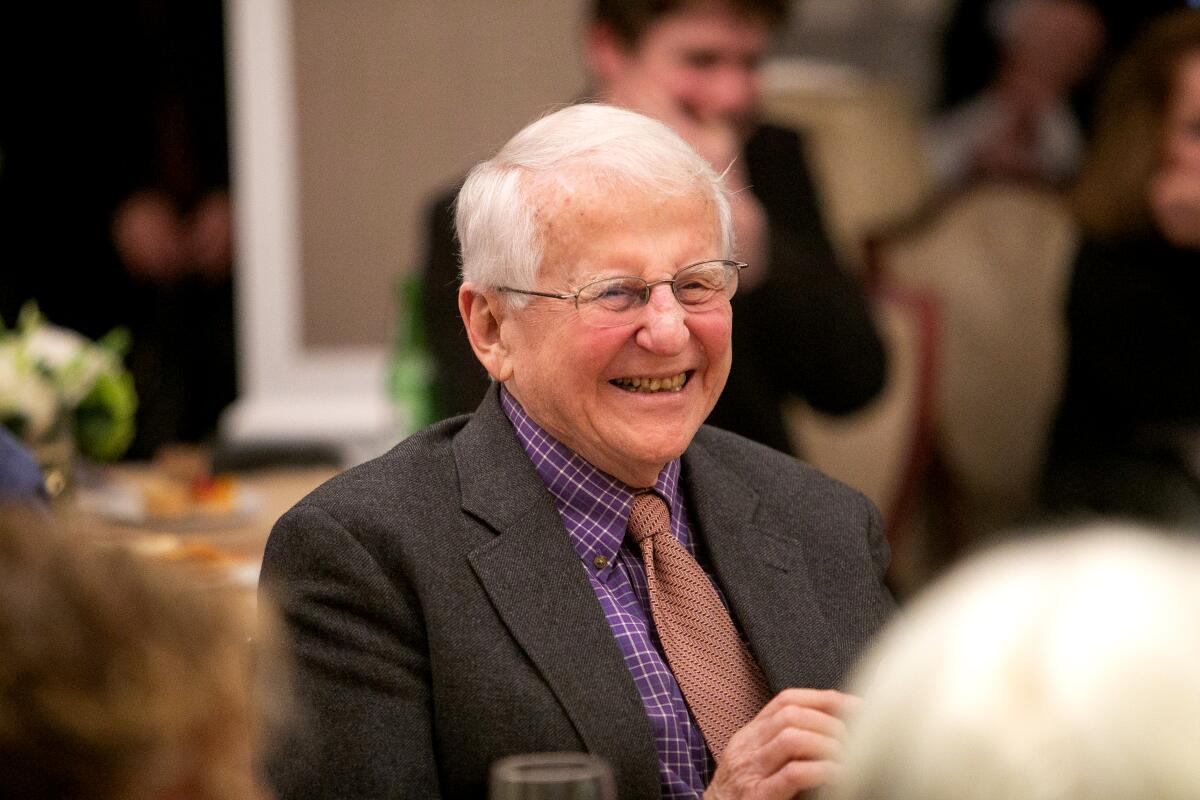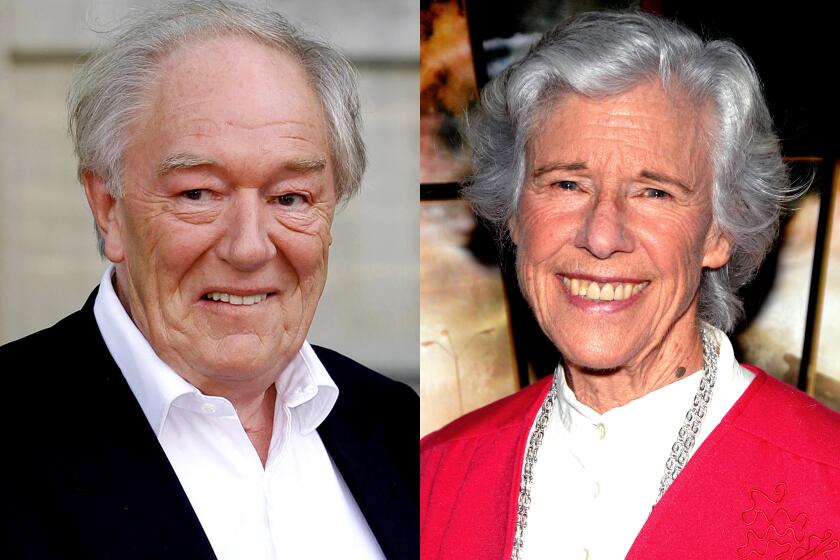Appreciation: Theater critic Gordon Rogoff found the most artful language to capture acting greatness

- Share via
“For the most part, playwrights represent recordable theatre history while actors, forlornly in the wings to the end, stand for unrecordable history.”
Theater critic Gordon Rogoff, who died last week at 92, made this observation in a 1966 essay on the state of British theater in the indignant wake of John Osborne’s “Look Back in Anger.” His criticism, collected in two anthologies, “Theatre Is Not Safe” and “Vanishing Acts,” is the perfect rebuttal to his point.
No critic since Kenneth Tynan was better able to capture in vivid, richly metaphoric language the unique brilliance of a stage performance. Rogoff understood that the actor was on the front lines of the theatrical event. He admired the performer’s courage, but even more he appreciated that the actor is where literature and the stage meet.
After receiving his undergraduate degree from Yale University, he sailed to England for a summer course at the Shakespeare Institute of the University of Birmingham, where he had the chance to observe Ralph Richardson in repertory at Stratford-upon-Avon. Although he hadn’t yet told his father, Rogoff was determined to stay in England.
His plan was to study acting, if he could pass the audition for London’s Royal Central School of Speech and Drama. He chose a text by Herman Melville rather than a more traditional monologue by Shakespeare, and his American ingenuity gained him entry.
The idea for a theater publication was brewing among his fellow acting students. In a short essay in the Tulane Drama Review, Rogoff described what led a group of aspiring thespians — Vanessa Redgrave, among them — to launch Encore magazine, which grew from a school publication into an international source of theater commentary.
“Between classes in speech, movement, history of costume, mime, and rehearsals of Shakespeare, Wycherley, and Lesley Storm (the standard repertory of British theatre at the time), we growled quietly about the stale, flat uses to which we saw ourselves moving, all those ‘tennis anyone’ entrances and stiff-lipped exits, a lifetime of dim-witted service to a laggard art,” he wrote. “Nobody was offering answers, in or out of class, yet it was clear that questions had to be asked.”
Broadway star and three-time Tony Award winner Chita Rivera achieved her diva-dom through sheer hard work, humility and humanity.
He served for a time as editor of Encore, glimpsing that his true gift was for writing, if not yet ready to embrace the insight. Rogoff, however, had the discernment to understand that the practice of theater and the practice of criticism were not incompatible.
His awards vindicated this conviction. Rogoff received a 1976 Obie for his production of “Old Timers’ Sexual Symphony” (shared with the play’s author, his life partner, Morton Lichter) as well as numerous prizes for his theater writing, including the George Jean Nathan Award and the Morton Dauwen Zabel Award in Criticism from the American Academy of Arts and Letters.
Criticism can, in the right hands, sometimes be more potent when it’s an inside job. After Rogoff returned to the U.S., he worked at the Actors Studio, closely observing the Method acting training of Lee Strasberg. In 1964, Rogoff wrote a withering critic of his boss titled “Lee Strasberg: Fire and Ice,” in which he questioned a cultish system of training that was oblivious to whole areas of the actor’s development, from voice to body work to familiarity with a whole range of playwriting and directorial styles beyond psychological realism.
On the strength of this influential essay, Rogoff was recruited by Robert Brustein, the newly appointed dean of the Yale School of Drama, to help transform a staid university theater program into a world-class professional conservatory.
Rogoff was on the faculty at Yale for more than 35 years, though not consecutively. A public fallout with Brustein over the drama school’s direction led to his departure. During this time, Rogoff held significant academic appointments at SUNY Buffalo and Brooklyn College, before returning to Yale in 1986.
Teaching was at the center of his professional life, but his approach to academia followed his approach to criticism and theater making. Unmarked by careerism (and coming of age at a time when that option was an affordable one), he hewed to his own inner dictates.
His output may have been slimmer than his talents warranted, but the quality of the work was unsurpassed. And he influenced generations of theater artists and critics, including myself, through his unorthodox teaching, which he pedagogically defended as the “exposure of sensibility.”
Rogoff’s theater criticism was long a mainstay of the Village Voice, often appearing beside the work of his gifted former Yale student Michael Feingold. No one wrote as eloquently or as humorously or as independently as Rogoff. Currying favor was antithetical to his temperament. The status quo was for dismantling. And upholding the reputation of artists was the job of publicists, not critics.
Kate Berlant plays an actor unable to cry on cue in her solo show ‘Kate,’ directed by Bo Burnham, at the Pasadena Playhouse.
The depth of Rogoff’s learning was as immense as it was personal to him. His impatience with auteurs who ran roughshod over actors was of a piece with his disdain for theaters that prioritize their organizational infrastructure over artists (a problem that Rogoff waggishly referred to as “the edifice complex”). His respect for “the playwright as thinker” equaled that of his mentor, Eric Bentley, who made the phrase the title of one of his seminal books. But the actor remained at the center of Rogoff’s theatrical universe.
Enthralled by George C. Scott’s 1982 Broadway revival of Noel Coward’s “Present Laughter,” Rogoff praised Scott’s performance in the role that Coward himself originated. Rogoff noted that in making the protagonist, Garry Essendine, “quite naturally more dimensional in every way than Coward or his imitators would ever be, bringing to Garry a physical bulk, a fullness of spirit, and a weight of emotional history,” Scott rescues the play from being “mainly about Garry’s dressing gowns and the telephone.”
Reviewing Kathleen Turner in a stage production of a play he didn’t think much of, Pam Gems’ “Camille” at the Long Wharf Theatre in New Haven, he reflected on what made Turner so gripping on screen: “More substantial, more soiled than Garbo, she nonetheless treats the camera in the same way — a friendly eavesdropper on her floating consciousness. Unlike Meryl Streep, that scholar of emotions, burrowing in the archives for card-indexed feeling, Turner lets anything happen. She’s large, but never so proud that she can’t be intimate.”
In his eulogy of Geraldine Page, he recalled the Actors Studio standard bearer’s “surprising voice, with its panpipings suddenly interrupted by great, flat baritone wails.” Mourning the great roles the American theater failed to provide her, he called her “that rare actor in America or anywhere else, the impish clown who, given half a chance, could blow the gods off Olympus.”
His high esteem for Ingmar Bergman’s stage productions had as much to do with the Swedish auteur’s boldly rigorous readings of classic texts as with the director’s concern for the human center of these plays. He praised the way Bergman’s contemporary “Hamlet” wasn’t “reducible to concept or shock” but allowed the play to emerge “like a painting scrubbed back to its original colors.”
Rogoff thought Dustin Hoffman’s performance as Shylock in “The Merchant of Venice” was at its best “when resisting bombast: the famous apostrophe to his own reality — ‘Hath not a Jew eyes?’ etc. — emerges pitilessly from true thought, newly coined as if he’s hinting that this is only the beginning.”
For Rogoff, Mark Rylance’s Hamlet was “the sweetest if most hair-raising complex prince” of his lifetime. His critical prose allows the performance to live again.
“Roaming the court in striped flannel pajamas, he’s a “Marat/Sade” inmate ready to bare a buttock to the prying Polonius, slam Ophelia to the ground with a violence that turns infuriatingly into softness and light, and paint Gertrude with the blood smearing his face and body after the murder of Polonius,” Rogoff writes. Key to the production’s success in his estimation was the way Rylance speaks with a “hushed persuasion that never lapses into rant or aria.” When Rylance’s Hamlet “returns to meet Yorick’s skull and Ophelia’s funeral,” he finds “something like unbrooding peace at last,” a description that Horatio might wish to borrow as he reports his friend’s story.
I could endlessly quote Rogoff, whose mentorship was all the more profound for his doubts about the role. Gurus offended him, for life was ultimately an individual conundrum that had to be uniquely met. But in addition to being my teacher and academic adviser, he was my friend for 35 years, guiding me through life’s storms with email missives that bucked up my courage in a prose style that Henry James would have admired.
As one of my regular theater companions on trips to New York, he refrained from showering me with his opinion on the show I was reviewing. He waited until publication to share his thoughts, not wanting to color my writing mind with his immediate reaction. A few years after graduate school, I pushed him to collect his writing in a second anthology, and typing an early manuscript of the book that became “Vanishing Acts” was perhaps the most fruitful apprenticeship a theater critic could ask for.
It wasn’t his verdicts that stayed with me. It was the pleasure he took in describing performers, the verve of his detail, the fierceness of his insight into aesthetics and psychologies.
It was also the shimmering beauty of his writing. Reviewing Vanessa Redgrave’s performance in Peter Hall’s revival of Tennessee Williams’ “Orpheus Descending” in London, he moved into prose poetry to capture the sublimity: “From her gray, sullen opening scenes to the final moments when she bursts like a gawky sunflower into the surrounding meanness, she moves mercurially from one texture to another, letting events catch her with a child’s surprise.”
Or take this example from his appraisal of another Central School alum, Judi Dench in David Hare’s “Amy’s View” on Broadway:
“What is it that Dench at her best does onstage? Some of her arsenal is simple enough: she listens, she breathes, she waits, she pokes at the flower arrangements while listening even more to the voices around her. Hare gives her the best passage in the play when, as an aging actress, she describes what it is to seize the moment, the stage. The description is the demonstration itself, as full, rounded, darkly burnished as anything you could hope to see or hear this side of lieder or chamber music.”
If criticism, as W.H. Auden said of poetry, “survives in the valley of its saying,” Rogoff’s work should long endure. At a time of shrinking outlets for arts journalism and rising doubt on the value and viability of reviews, the best case that can be made is by writing of this caliber.
Rogoff recognized that “real criticism, as opposed to consumer reports, is an act of writing, an effort to meet artists on their own terms.” He knew that for the vast majority of theater artists “the secondary action of the critic — rendering opinions — is all that matters. Why take trouble over a flashing perception that criticism might emerge from a solitude like their own?”
Theater criticism may be a minor art that’s practiced at the highest level in the best of times by a select few, but Rogoff exemplified what can be achieved in the form. Ephemeral greatness preserved, artistic values clarified and magisterial writing demonstrating, through its own excellence, what ought to matter.
In 2023, the theater lost many notables with long careers, including Michael Gambon, Frances Sternhagen, Glenda Jackson, Barry Humphries and Michael Blakemore. Praising those we lost makes the remembrance dear.
More to Read
The biggest entertainment stories
Get our big stories about Hollywood, film, television, music, arts, culture and more right in your inbox as soon as they publish.
You may occasionally receive promotional content from the Los Angeles Times.














